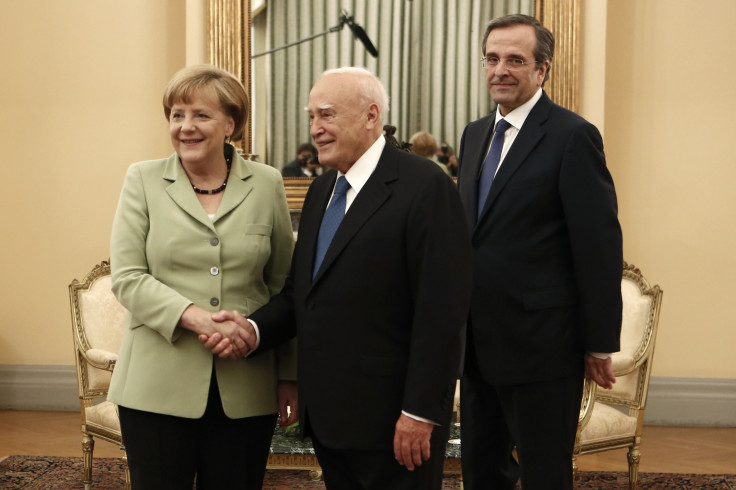In Contentious Visit, Merkel Says Greece On The Right Path, Must Adhere To Austerity

As public displays of anger and protest surrounded her, German chancellor Angela Merkel smiled and shook hands with the leadership of Greece's political class on Tuesday, in what was arguably the most dramatic and significant visit from a European leader to another country on the Continent since the turn of the century.
“I want Greece to remain in the euro,” Merkel said at a news conference following a meeting with Prime Minister Antonis Samaras, where she also told journalists she was visiting to deliver a message of friendship to the Greek people and encourage their grit in following painful austerity measures that have plunged the country's economy into a depression.
"We really can see light at the end of the tunnel," she added.
Merkel stayed away from issuing any judgment on how well the Greek leadership has been able to implement measures the country had agreed to as part of a multibillion-euro sovereign bailout, a thorny issue given that Greece's government is currently negotiating that point with the trio of international institutions that provided the financing.
The German chancellor noted she was not in Athens “as a teacher, to give grades,” but rather as “a real partner," although she later cautioned that the austerity program "is an effort that should be seen through because otherwise it would make the circumstances even more dramatic later on."
Instead, Merkel focused on giving words of support to her counterpart and the Greek population at large, acknowledging that there were "many people suffering in Greece" as a result of the financial crisis and austerity measures and that the past few years had been a "difficult" path for the country.
Standing next to Merkel at the news conference, Samaras said their meeting had been "dominated by frankness, mutual understanding, solidarity, a spirit of collaboration and a feeling that we can overcome the Greek problem, and obviously, the European problems alike."
Samaras framed the event as proof that Greece was "breaking an international isolation that existed to now," rehashing the argument that calls by his predecessor for a referendum on austerity measures had badly hurt the international legitimacy of the Greek government.
And he reminded Greeks that "the recession is the enemy."
Those words seemed lost on the tens of thousands of protestors that flooded the streets of Athens throughout the day, carrying banners asking Merkel to leave, expressing their anger at the government or mocking the German leader by depicting her wearing Nazi paraphernalia.
In spite of massive security preparations, which included sealing off much of downtown Athens, banning public demonstrations in certain parts of the city, and activating 7,000 police officers to form a security cordon, angry and sometimes violent acts of defiance were the story of the day.
Clashes broke in the Athens' central Syntagma square after groups of youths hurling rocks were greeted by the police with stun grenades and tear gas, according to the Wall Street Journal.
Elsewhere, people directed their anger directly at Merkel.
“This is pure provocation, we have to answer back,” Christina Amanti, a 37-year-old nurse, told the New York Times. “It’s like she’s visiting her protectorate. What’s she going to do, pat us on the back and tell us to keep getting poorer, that it’s good for us?”
Outside Greece, Merkel's visit was perceived not so much with anger as with despondency, and it was widely viewed as unlikely to help with the evolving crisis in Europe.
The release of an IMF report that coincided with Merkel's trip noted it would be nearly impossible for Greece to meet the targets set during the last sovereign bailout and would almost certainly need a new cash infusion, the third such eventuality in four years.
The report, which dealt with the global economy at large, presented an economic picture bleaker than the one portrayed at the last IMF presentation a year ago. It said the risk of further weakening was "considerable."
© Copyright IBTimes 2024. All rights reserved.











